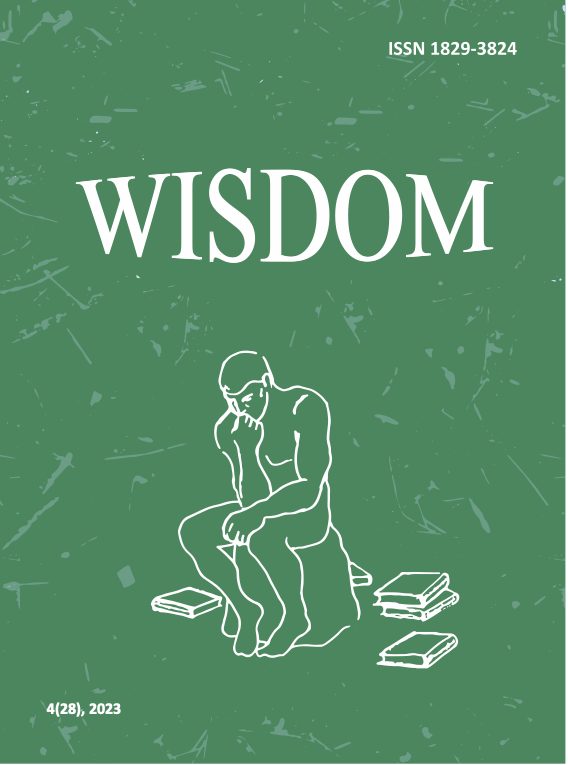Verbal And Non-Verbal Characteristics Of Approval Speech Act
DOI:
https://doi.org/10.24234/wisdom.v13i2.264Keywords:
evaluation, speech act, approval, verbalized kineme, gesture, facial expressionAbstract
The paper focuses on verbal and non-verbal characteristics of approval speech act in English literary discourse. Approval evaluation object have been identified including things, ideas, facts, traditions, weather conditions, events, pieces of news and other phenomena that become evaluated. It has been proved that approval evaluation objects never refer to the addressee's sphere of interests and that the approval recipient and the evaluation object of approval never overlap. The article also dwells on illocutionary aims pursued by approval speech act addressers and the perlocutionary effect of approval speech act. The main part of the paper considers lexical, morphological, syntactic, and stylistic means applied by the personages of literary fictional discourse to express approval of a certain object. Finally, non-verbal means manifesting approval have been identified. It has been found out that in literary fictional discourse it is the verbalized kinemes that specify the emotional state of the approval addresser and signal whether the approving utterance is sincere or not.
Downloads
References
Barr, E. (2007).Out of my Depth. London: Headline Review.
Beaton, M. C. (1998). Death of a Scriptwriter. New York: Mysterious Press.
Beaton, M. C. (2009). Agatha Raisin and the Wizard of Evesham. London: C & R Crime.
Bigunova, N. O. (2017). Pozytyvna otsinka: Vid kohnityvnoho sudzhennia do komunikatyvnoho vyslovliuvannia (Positive Evaluation: From Cognitive Judgment to Communicative Utterance, in Ukrainian). Odesa: OMD.
Bigunova, N. O. (2019). Cognitive Pragmatic Regularities in Communicative Mani-festation of Positive Evaluation. Language Yesterday, Today, Tomorrow. The journal of University of SS Cyril and Methodius in Trnava, IV(1), 2-46. Trnava: the University of SS Cyril and Methodius in Trnava.
Christie, A. (2010). The Murder at the Vicarage. London: Harper Collins Publishers.
Cohen, J. (2010). Getting away with it. London: Headline Review.
Gaiman, N. (2013). The Ocean at the End of the Lane. London: Harper Collins Publish-ers.
Goryainova, N. N. (2010). Strategii i taktiki rechevogo povedeniya s primeneniem vyskazyvanii pohvaly i odobreniya (Strategies and Tactics of Speech Behavior when Using Praise and Approval Utterances, in Russian). (Thesis for the candidate degree in philology, Stavropol State University, Stavropol, Russia).
Highmore, J. (2009). Message. London: Headline Review.
Hooper, J. B., & Thompson, S. A. (1973). On the Applicability of Root Transformations. Linguistic Inquiry, 4(4), 465-497.
Kabankova, T. V. (2011). Funktsionirovanie sinkretichnykh rechevykh aktov odobreniya / neodobreniya v sovremennom nemetskom dialogicheskom diskurse (Functioning of Syncretic Speech Acts of Approval / Disapproval in Modern German Dialogue Discourse, in Russian). (Thesis for the candidate degree in philology, Tambov State University, Tambov, Russia).
Kinsella, S. (2000). The Secret Dreamworld of a Shopaholic. London: Black Swan.
Kinsella, S. (2001). Shopaholic Abroad. London: Black Swan.
Kinsella, S. (2002). Shopaholic Ties the Knot. London: Black Swan.
Kolegaeva, I. & Strochenko, L. (2018). Academ-ic and Literary Communication: Addressability, Statuses, and Functioning. Lege Artis. Language Yesterday, Today, Tomorrow. The journal of Univer-sity of SS Cyril and Methodius in Trnava, III(2), 72-104.
Lee, D. H., Mirza, R., Flanagan, J. G., & Anderson, A. K. (2014). Optical Origins of Opposing Facial Expression Actions. 22
Psychological Science, 25(3), 745-752. doi: 10.1177/0956797613514451
Mansell, J. (2008). Mixed Doubles. London: Headline Review.
Meyer, S. (2009). Twilight. London: Atom.
Morton, K. (2010). The Distant Hours. London: Pan Books.
Niffenegger, A. (2009). Her Fearful Symmetry. London: Vintage Books.
Parks, A. (2011). Men I‟ve Loved Before. London: Headline Review.
Parsons, A. D. (2010). The Call on High Country. London: Penguin Global.
Popik, I. P. (2008). Verbalizatsiya kinesiki v khudozhestvennom tekste (The Verbali-sation of Kinesics in Fictional Text, in Russian). Zapiski z romanogermanskoї filologii: Zbirnik naukovikh prats fakultetu RGF ONU. No 21, 138 – 148.
Prihodko, A. I. (2016). Cognitive-Communicative Organisation of the Evaluative Frame. Lege Artis. Language Yesterday, Today, Tomorrow. The journal of University of SS Cyril and Methodius in Trnava, I(1), 275-308.
Pym, B. (1989). Quartet in Autumn. London: Grafton Books.
Pym, B. (2009). A Glass of Blessings. London: Virago.
Roberts, G. D. (2008). Shantaram. London: Abacus.
Ruston, J. (2010). To Touch the Stars. London: Headline Review.
Spark, M. (2010). Memento Mori. London: Virago.
Trollope, J. (2001). Marrying the Mistress. London: Black Swan.
Trollope, J. (2002). The Best of Friends. New York: Berkley Books.
Trollope, J. (2014). A Village Affair. London: Berkley Trade.
Weldon, F. (1985). Puff Ball. London: Coronet Books.
Wickham, M. (1996). The Tennis Party. London: Black Swan.
Williams, P. (2010). How to be Married. London: Headline Review.
Wolf, E. (2002). Funktsional'naya semantika otsenki (Functional Semantics of Evaluation, in Russian). Moscow: Editorial URSS.
Yaroshevich, E. V. (2003). Konstruktsii odobreniya i pooshchreniya v stilistiko-sintaksicheskom aspekte (na materiale sovremennogo angliiskogo yazyka) (The Constructions of Approval and Encouragement in Stylistic-Syntactic Aspect (on the Modern English Language Samples), in Russian). (Thesis for the candidate degree in philology, Moscow State Pedagogical University, Moscow, Russia).
Downloads
Published
How to Cite
Issue
Section
License
Creative Commons Attribution-Non-Commercial (CC BY-NC). CC BY-NC allows users to copy and distribute the article, provided this is not done for commercial purposes. The users may adapt – remix, transform, and build upon the material giving appropriate credit, and providing a link to the license. The full details of the license are available at https://creativecommons.org/licenses/by-nc/4.0/.















